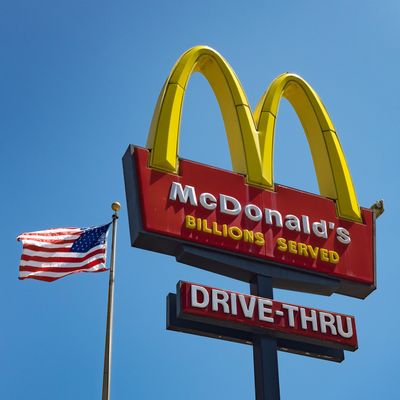
On its social-media accounts, McDonald’s says that Black lives matter. But three workers at a Lakeland, Florida, location tell a different story about the burger chain. On Friday, they filed a federal civil-rights lawsuit in Tampa, Florida, alleging that a Latina manager created a racially hostile environment at work. The workers — Faith Booker, Monica Scott, and Augusta Moody — said the manager repeatedly made racist comments about Black customers. When they complained, the manager retaliated against them, and generally subjected Black workers to disproportionate levels of discipline.
The complaint depicts failures that are core to the McDonald’s business model. At the bottom rung of the ladder, the chain’s fry cooks and cashiers are at the mercy of their managers and franchisees. Their low wages keep them desperate for hours and raises; a natural incentive to organize, but also a potential obstacle for workers who need to report abuse. When Booker, Scott, and Moody spoke up anyway, they paid for it.
But the store’s general manager left them little choice but to complain, they said on a press call with reporters. The woman, who has not been named, “treats Black employees more harshly and says hateful things about Black people that made me feel like crying,” Scott said. She cited a specific incident detailed in today’s filing: “Once when a Black customer asked for ketchup and grape jelly to accompany an order of a sausage biscuit and hash browns at the drive-though, the general manager told me that it’s always Black people who want free stuff,” she explained. “The manager followed up by stating that Black people are aggressive and trying to fight, and all they want to do is smoke weed.” Moments earlier, she added, the manager had given a white, female customer extra condiments with no complaints.
Black customers were generally treated far differently than their white counterparts, she and her fellow plaintiffs said. The Lakewood location — which, unlike most McDonald’s stores, is corporate-run — has been offering frontline workers and first responders free meals during the pandemic. Scott said the Black essential workers were “singled out” and asked to show ID before getting their meals, white workers weren’t asked to do the same. The assumption, she added, is that Black customers were “gaming the system.” Workers, including Scott, said they complained to corporate human resources, but were told that nothing would be done because the manager ran a profitable store. They were later punished with extra physical labor, reduced hours, and poor performance reviews.
A press release from the Fight for $15 and a Union notes that this isn’t the first racial-discrimination suit filed by McDonald’s employees. Two Black executives, Vicki Guster-Hines and Domineca Neal, sued the company in January, claiming that McDonald’s CEO Chris Kempczinski and his immediate predecessor, Steve Easterbrook, purged high-ranking Black staff after they assumed their positions. As NBC News reported at the time, the lawsuit alleged that “between 2014 and 2019, McDonald’s terminated 30 black officers and demoted five,” including the executives who sued. That pattern of discrimination filtered down to the company’s franchise owners, Neal and Guster-Hines claimed. According to the suit, a decline in the number of Black franchisees accompanied that corporate purge, a trend the executives attributed to widespread unfair treatment.
The pandemic may have only heightened tensions between McDonald’s corporate leadership and its workforce. The Florida lawsuit follows a new survey from the Service Employees International Union and Fight for $15, which details a rampant lack of protective gear and a pattern of violent customer behavior over the last several months. Store surveyors visited 116 corporate-run and franchised locations. They found that managers frequently failed to enforce local safety orders, and ignored McDonald’s corporate guidelines for keeping employees and customers safe from COVID-19. Out of the workers who responded to the survey in June, one in three said they lacked at least one necessary item of protective gear; one in seven said they lacked two such items, which include masks and hand soap. At 44 percent of the stores the surveyors visited, workers were either not wearing a mask or wore them incorrectly. Two-thirds also said that it remained difficult to practice social-distancing in stores.
Meanwhile, many workers felt they had to clock in while sick. Seventy-two percent said their location didn’t offer paid sick leave; 60 percent said they couldn’t afford to stay home; and 59 percent said that if they did stay home, they expected retaliation from their managers. Those corporate practices can be especially burdensome for Black and brown workers, the survey noted. Some, like Scott, Moody and Booker, had to endure racism from their bosses, too.
On Monday, many McDonald’s workers will join a nationwide Strike for Black Lives. They’ll remind us — and their bosses, too — that the causes of racial and economic justice are the same. It’s the same message that Fight for $15 activists have repeated for years. If McDonald’s cares about Black lives, its executives will finally listen. Evidence suggests that they won’t.
This piece has been updated to correct the race of the Lakeland manager.






























